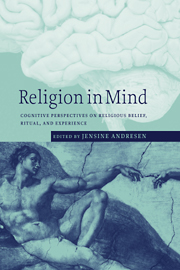Book contents
- Frontmatter
- Contents
- Notes on contributors
- 1 Introduction: towards a cognitive science of religion
- PART I BELIEF ACQUISITION AND THE SPREAD OF RELIGIOUS REPRESENTATIONS
- PART II QUESTIONING THE “REPRESENTATION” OF RELIGIOUS RITUAL ACTION
- PART III EMBODIED MODELS OF RELIGION
- 8 Cognitive study of religion and Husserlian phenomenology: making better tools for the analysis of cultural systems
- 9 Why a proper science of mind implies the transcendence of nature
- 10 Religion and the frontal lobes
- 11 Conclusion: religion in the flesh: forging new methodologies for the study of religion
- Index
11 - Conclusion: religion in the flesh: forging new methodologies for the study of religion
Published online by Cambridge University Press: 02 December 2009
- Frontmatter
- Contents
- Notes on contributors
- 1 Introduction: towards a cognitive science of religion
- PART I BELIEF ACQUISITION AND THE SPREAD OF RELIGIOUS REPRESENTATIONS
- PART II QUESTIONING THE “REPRESENTATION” OF RELIGIOUS RITUAL ACTION
- PART III EMBODIED MODELS OF RELIGION
- 8 Cognitive study of religion and Husserlian phenomenology: making better tools for the analysis of cultural systems
- 9 Why a proper science of mind implies the transcendence of nature
- 10 Religion and the frontal lobes
- 11 Conclusion: religion in the flesh: forging new methodologies for the study of religion
- Index
Summary
My title, which obviously tips its hat to Lakoff and Johnson's (1999) excellent retooling of philosophical methodology, underscores the importance of staying current with research in many fields as we continue to search for new ways to understand religion. Interdisciplinary collaborations of the past decade or so have demonstrated that methodologies from one single discipline often fail to capture the conceptual and lived nuances of complex phenomena. We therefore must remain flexible and fluid, adopting more rigorous forms of empirical study and staying attuned to more detailed expositions of phenomenological realities. Cross-cultural, ethnographic data raise the importance of individuals' interpretations of their symbolic, religious worlds within the complex contexts of communities and larger social groups. This research likewise suggests an underlying human commonality in the types of religious worlds represented, and in the mode of representation, both of which belie the dependence of religious states and processes upon the human brain.
Frake's (1997, 33) description of methodology as “theoretically motivated notions of what to do when faced with the real world” is appropriate – methodology links data, i.e., what we construe to be observations of some particular reality, to theory, i.e., our proposals for understanding reality in general. But because academic fields often are defined by a set of problems and a range of research methods (Beit-Hallahmi and Argyle 1997, 5), multidisciplinary endeavors always raise the question of just whose method will be used.
- Type
- Chapter
- Information
- Religion in MindCognitive Perspectives on Religious Belief, Ritual, and Experience, pp. 257 - 287Publisher: Cambridge University PressPrint publication year: 2001
- 3
- Cited by



